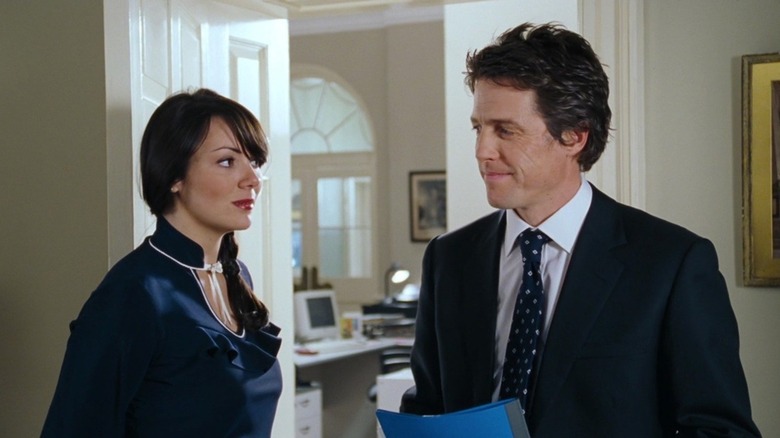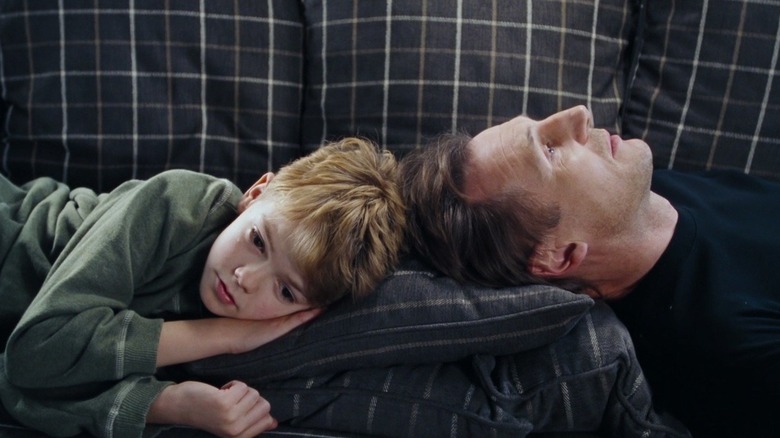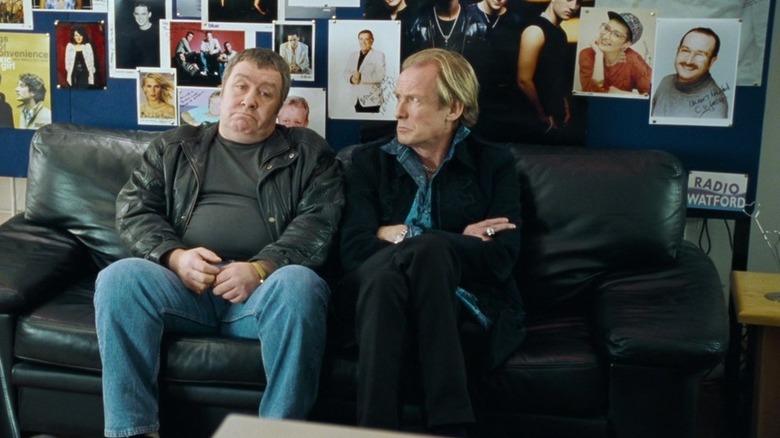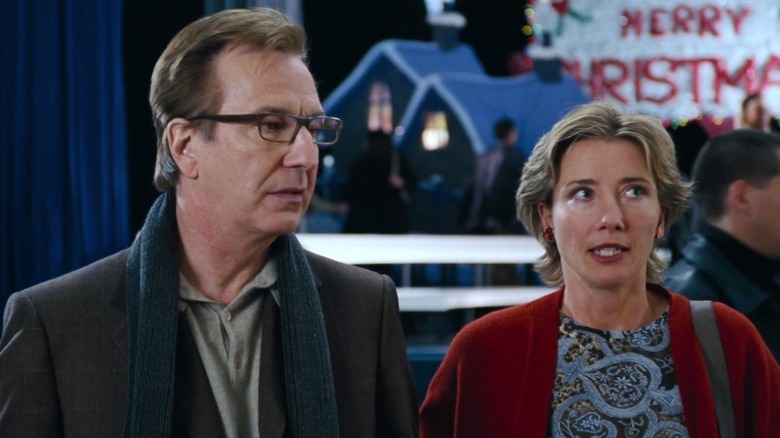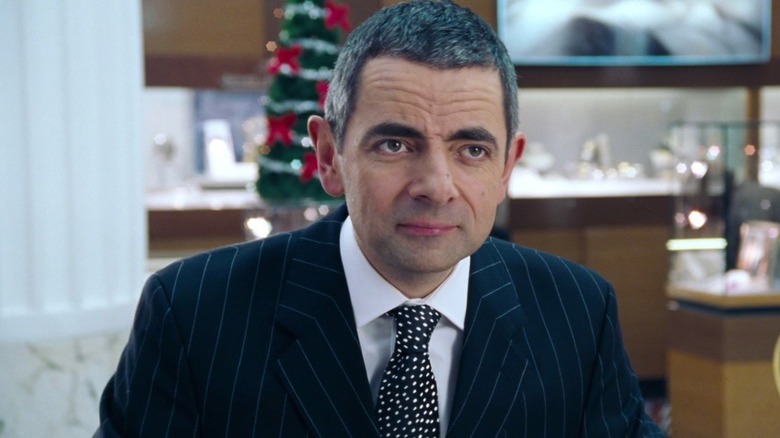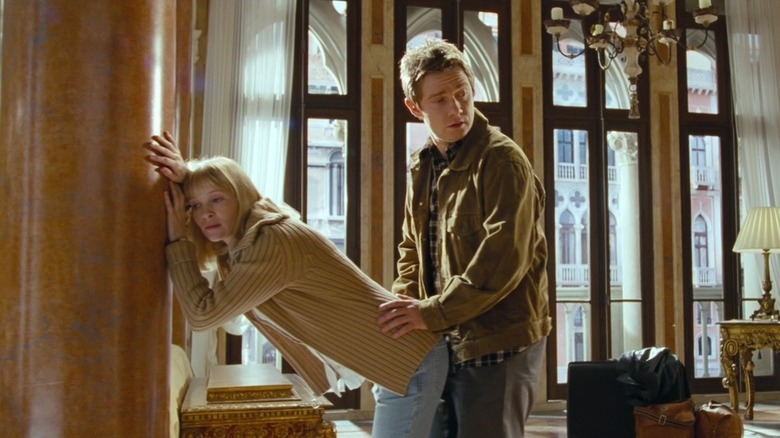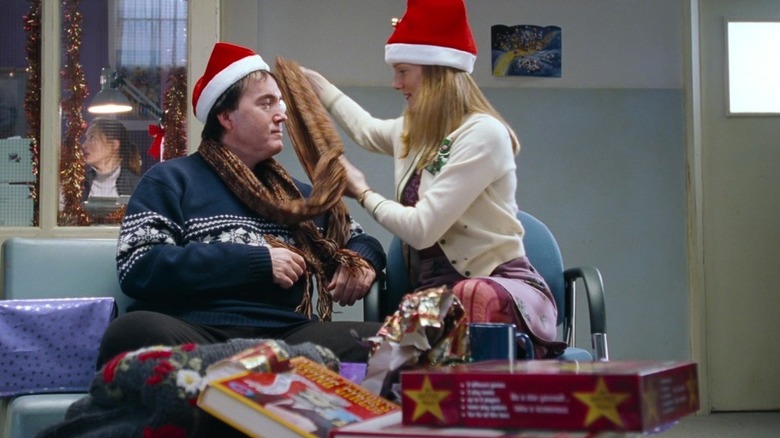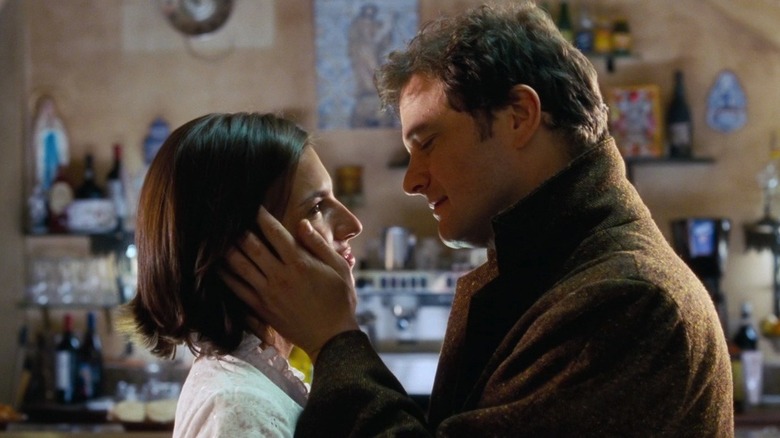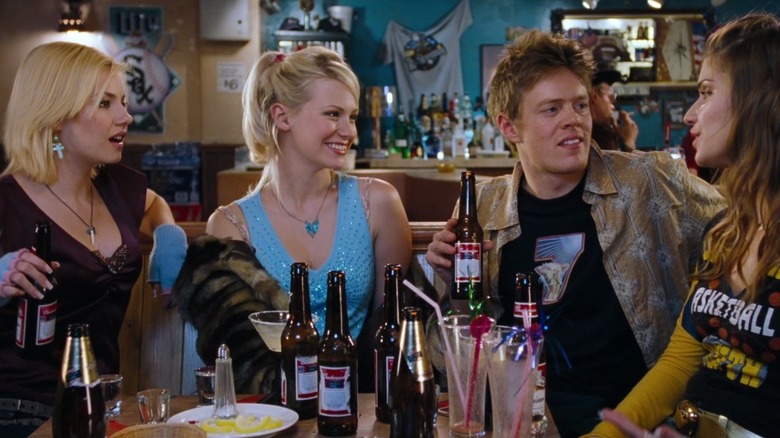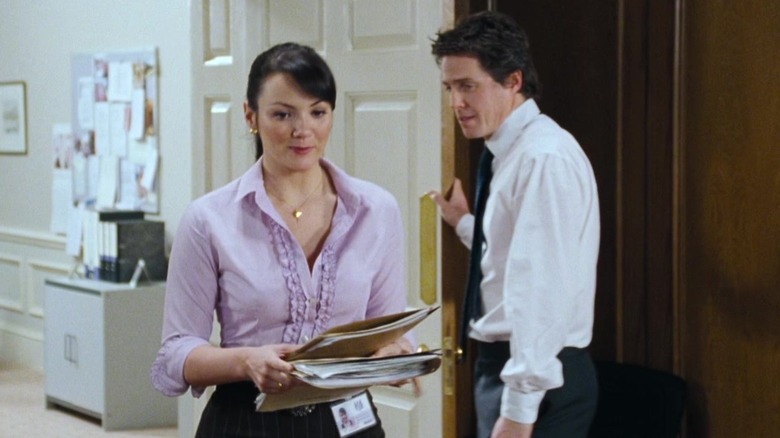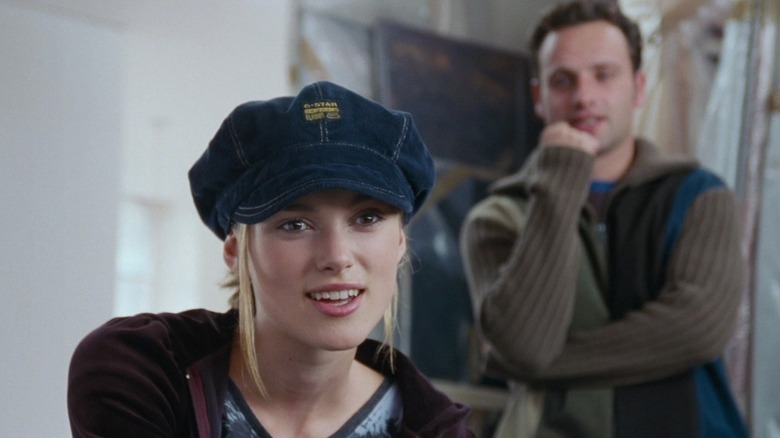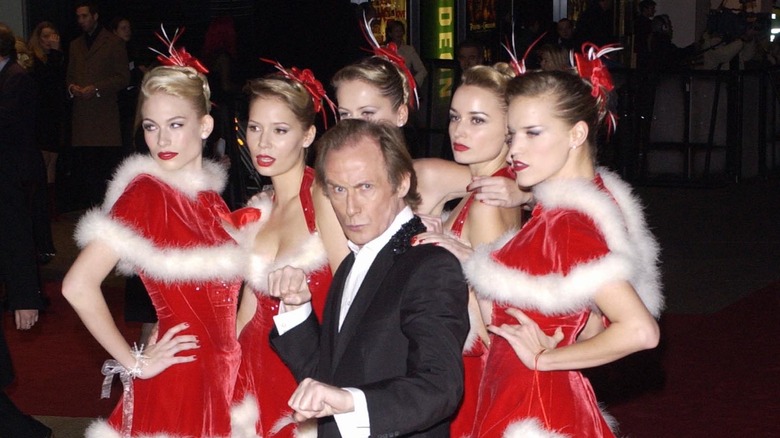Love Actually Storylines Ranked From Cute To Creepy
Any cultural phenomenon from 20 years ago will always be interesting to look back on, but "Love Actually" is a particularly strange beast in retrospect. A "hyperlink film" of the kind that was all the rage in the 2000s (and which has fallen dramatically out of fashion since), it managed to win a cynical, despondent Anglosphere back over to the side of sappy Christmas romance, by offering a version of it infused with snarkiness, crude humor, and emotional complexity. In other words, it was a Richard Curtis film for a post-9/11 world — and isn't that just a wild concept when you consider it?
"Love Actually" is, indeed, a wild film. It's by turns sweet and sad, dutiful and devilish, frank and facetious — sometimes within the same plot. In his quest to rehabilitate the Christmas love story for a cold-hearted audience, Curtis tried to work some kind of novelty into each of the film's narratives, all deviating from the standard "boy meets girl" mold in some way. In some cases, that irreverence resulted in truly wonderful filmmaking, with deeply human, charming tales of love and connection that deserved to become essential holiday season viewing. In others, well, let's just say there was a reason why certain romance plots were not usually done in the context of escapist romcoms. Join us as we take a look back at "Love Actually," ranking all of the storylines from cutest to creepiest.
Daniel and Sam
As far as cuteness goes, it's hard to beat the storyline that features 12-year-old Thomas Brodie-Sangster giving maybe the most adorable child performance in Christmas movie history. But his presence is far from the only reason why Sam and Daniel's (Liam Neeson) plot is the most heartwarming thing in "Love Actually." In a lot of ways, that earnest story of a widower dealing with his grief and fighting off hopelessness by caring for his stepson is the centerpiece of the film — the core element that makes it what it is.
For starters, the dynamic between Neeson's and Sangster's characters — suddenly brought together like never before by unspeakably tragic circumstances, isolated from the world by their grief yet finding a safe harbor in each other — is layered and beautiful, a foray into heady emotional territory that still manages to preserve the film's light, hopeful touch. On top of that, it's this story that offers the film's clearest thesis statement on its titular theme. While mentoring Sam as he experiences his first brush with matters of the heart, Daniel also embarks on a process of reminding himself — and us — that love is still worth pursuing. All ultimately ends well, of course, but the getting there feels thoroughly real and earned: When Daniel finds himself opening up to love again, it's a natural endpoint to the emotional arc he's been through. Plus, there's just no beating this film's take on the last-minute airport run.
Billy Mack and Joe
The second most endearing storyline in "Love Actually" is the one that isn't actually romantic, or connected to any of the others. In the lead-up to Christmas, washed-up rock legend Billy Mack (Bill Nighy) records a cover of the Troggs' "Love Is All Around," with the chorus reworded to "Christmas Is All Around." With his lifelong manager Joe (George Fisher) by his side, he promotes it on the radio in hopes of scoring the year's Christmas number-one single. Mack openly admits in interviews that he thinks it's a terrible record that doesn't speak to him personally, since he alienated everybody who loved him with his selfish and reckless behavior during his prime. It's a largely humorous storyline buoyed by Nighy's incandescent charisma — but there's still an undercurrent of melancholy to hearing him nonchalantly confess to his loneliness.
When Mack's gambit works and his song tops the chart, he receives an invitation to a Christmas party in his honor at Elton John's house. However, Mack decides to ditch the party and stay home with Joe. As success unexpectedly finds him again, Mack realizes that Joe is the "f***king love of [his] life" — and that, if there's anyone he should be spending Christmas with, it's him. It's a sweet declaration of love's ability to take many forms in a person's life, as well as a reminder that even those who have made serious mistakes in the past may still have people sticking by their side if they're willing to pay attention.
Karen and Harry
Here's a storyline that, while not happy or uplifting by any stretch of the imagination, still manages to be one of the film's most moving — and strangely life-affirming in its own way — thanks to its aching, deeply honest humanity.
The set-up is fairly simple: Karen (Emma Thompson) and Harry (Alan Rickman) are a happily married couple with two children. Harry works as the director of a design firm, while Karen stays at home and cares for the kids. They've been building this life together for 13 years, and Karen, an inveterate romantic throughout her whole life, firmly believes that nothing can shake the foundations of their love. But things start to fall apart when Mia (Heike Makatsch), Harry's secretary, starts openly and intensely flirting with him — and Harry, despite some trepidation, reciprocates her advances.
While the "homewrecking sexpot secretary" trope isn't without its traces of early-2000s sexism, Karen and Harry's story works — and remains timeless two decades on — because the film explores in great depth what the situation entails for the two of them. More specifically, it paints Karen's pain in vivid, aching colors, but without succumbing to sentimentality: She keeps a brave face for the sake of Christmas and her children, while privately coming to a steely understanding about the degree to which Harry has insulted her and jeopardized her world. It's left unclear at the end if their marriage will survive, but, whether or not it does, the emotion in their story is unshakable.
Rufus
Rowan Atkinson's character, Rufus, doesn't exactly have a storyline of his own in "Love Actually." He appears in two scenes, first as the department store worker who gift-wraps the jewelry that Harry is buying for Mia while Karen is not looking, and then as the eccentric passenger who doesn't know where he's put his boarding pass, creating a distraction that allows Sam to bypass airport security and go talk to Joanna (Olivia Olson) before she boards her flight. But it's telling that Atkinson appears on the film's poster, ahead of several actors who do have storylines.
Sure, some of that can be attributed to Atkinson's star power. But, more than that, Rufus' contribution to the film is so memorable because it quietly bridges the film's two most persuasive romance-themed storylines in a delightfully witty way, via both the story itself and Atkinson's casually, uncharacteristically warm — yet typically hilarious — performance. First, Rufus' ridiculously belabored gift-wrapping almost allows Karen to catch her husband in the act; then, Rufus' bumbling behavior gives Sam the opportunity to voice his feelings for Joanna. Throughout his story, Rufus embodies the spirit of love as an entity that feigns naiveté, yet quietly demands and desires honesty — a seemingly fortuitous occurrence that's quietly pushing people to tell the truth and unveil the reality of themselves to each other. Although Rufus doesn't appear in any other stories, that theme reverberates throughout the film.
John and Judy
It's rather ironic that for all the contemporary internet debate about movie sex scenes and their necessity, morality, or propriety, the "Love Actually" storyline about stand-ins shooting sex scenes is among the few that don't feature any overtly problematic elements.
It helps, of course, that the whole point of John (Martin Freeman) and Judy's (Joanna Page) story is exaggerated comic dissonance: Although the acts they're physically mimicking are salacious and deeply intimate, every non-professional interplay they have is steeped in the awkwardness of co-workers slowly developing an interest in each other without quite knowing how to voice it. Despite the comedic framing, theirs is the gentlest, tamest, most straightforward love story in the film — which is not at all a bad thing when actors as talented as Page and Freeman are the ones selling it. It's a joy to watch their conversations evolve from cautious small talk to a more relaxed camaraderie and finally to an official date invitation.
While the storyline as a whole is too slight and simple to be a patch on the most heartwarming parts of the film, it still ranks among the cutest "Love Actually" plots because its central conceit is just so darn clever. If so much of the romance genre gets lust and emotional connection unduly mixed up, John and Judy's story acknowledges the difference and makes a meal of it — which isn't to say that their romance is chaste, as evidenced by the very last time we check in on them.
Sarah, Karl, and Michael
Sarah (Laura Linney) is an American working at Harry's design agency, and has been in love with dreamily beautiful head designer Karl (Rodrigo Santoro) for the entire time she's been there. At the company Christmas party, Karl invites her to dance, he then gives her a ride home, they kiss in the hallway, and one thing leads to another. But their would-be night together, and by extension their romance, is interrupted by a call from Sarah's brother, Michael (Michael Fitzgerald), who suffers from an unspecified mental illness and needs constant care and attention.
The film attempts to position this story as a "tragic complexities of real life" tale, with Sarah understanding that she's missing out on her own life, yet not having the choice to abandon her brother. Linney and Santoro both do excellent work, fully attuned to their characters' knotty feelings, with arguably the strongest chemistry out of any couple in the film. But the suggestion that Sarah and Karl can't act on their mutual attraction because of Sarah's brother leaves a sour taste in the mouth. In addition to making little concrete sense and bizarrely framing Sarah's complete self-abnegation as touchingly altruistic as opposed to unhealthy and unnecessary, the story falls back on an incredibly ableist trope: Positioning mentally ill people as draining nuisances in the lives of the neurotypical. Life is complicated, yes, but surely Sarah can find a more sustainable balance.
Jamie and Aurélia
This is where things start getting really weird. It's telling that, out of the several poorly aged romances in "Love Actually," the one between a wealthy man and his housekeeper manages to be the least creepy. In fairness, if you abstract the entire context of Jamie (Colin Firth) and Aurélia's (Lúcia Moniz) relationship, their interactions are cute and endearing enough. The film gets a lot of mileage out of their strictly declaratory dialogue, showing that they're both unwittingly in emotional lockstep, both pining secretly for each other. But stop to think for a second, and it all falls apart.
For starters, if the John and Judy storyline does a great job of untangling physical attraction from affection, this one mashes everything together again: What is a "romantic" bond between two people who can't verbally communicate or get to know each other, if not massive lust augmented by projections? And even if you chalk that up to just-go-with-it romcom logic, the sheer power imbalance between Jamie and Aurélia remains impossible to get past. Jamie may not explicitly come on to Aurélia while she's working for him — this would be at the bottom of the ranking if he did — but the film is still propagating the idea of a "genuine" boss-housekeeper love as something feasible and aspirational. It would be another thing if the love in question had any substance; relationship stories can have thorny dynamics and still be compelling. But Richard Curtis is aiming for mindless enchantment, and it's hard to be mindlessly enchanted by something so alarming.
Colin and the American girls
In the most overtly comedic subplot in "Love Actually," persistent yet inept womanizer Colin (Kris Marshall) decides that he finds British girls too "stuck-up" for his liking — they keep rejecting him, after all. He then makes an impromptu decision to travel to the United States, in hopes that his British accent alone will make him a desirable item in the American dating market. Although his friend Tony (Abdul Salis) scoffs at the idea, Colin eagerly hops on a flight to Milwaukee, WI. And, sure enough, gorgeous American girls start falling all over him the moment he sets foot outside his plane.
What makes this storyline excruciating is not just the fact that Colin is a misogynistic jerk who gets rewarded by the universe for his boneheaded beliefs about women — it's also the fact that it's a massive tonal fumble. An undercurrent of cheeky mischief and cynicism runs through all of "Love Actually," occasionally yielding great stuff, such as in any scene involving Billy Mack. Here, Richard Curtis wants the absurdity of Colin's situation to be the point, and we're supposed to laugh at how cartoonishly easy it is for him to get women's attention in America. But it's just not a funny joke. Not surrealistically, because it gets old incredibly fast and just keeps going, and not observationally unless one has fun "observing" any demographic of women be reduced to ridiculous herd behavior like zoo animals. It's a lazy "Family Guy" gag in the middle of a movie with no room for such a thing.
David and Natalie
If you thought the power imbalance between Jamie and Aurélia was bad, wait until you see what kind of power Hugh Grant's character yields. Absurdly enough, this is also the story of a romance between a wealthy man and a housekeeper under his employment, which also expects viewers to not be weirded out because the man doesn't actively pursue the housekeeper while she's working for him. But what gives this a significant edge of creepiness over the Jamie and Aurélia plot is the fact that the man in question is the Prime Minister of the United Kingdom.
As it must be to avoid emotional realism and attending real-life concerns, the flirtation between David (Grant) and 10 Downing Street employee Natalie (Martine McCutcheon) is feather-light, perfunctory stuff, carried by Grant and McCutcheon's charisma alone. That makes it marginally less disturbing, but a lot more ridiculous, when Natalie — after David has her moved to another office — leaves him a note confessing her love, thereby giving him narrative permission to chase after her. It's just an ill-conceived idea, a troubling, unconvincing courtship no matter how you slice it. And, adding insult to injury, the film has the gall to contrast David with the U.S. President (Billy Bob Thornton), who openly harasses Natalie — as if to tell viewers, "This is creepy, that isn't." How about no heads of government come on to current or recent office staff, regardless of whether or not they "started it?"
Juliet and Mark
And there we have it. The poorly-aged rom-com storyline to end them all. The ne plus ultra of creepiness. The defining 21st-century cultural image of rewarded stalking. Thankfully, virtually everything involving Mark (Andrew Lincoln) and Juliet (Keira Knightley) in "Love Actually" has become something of a punchline in the two decades since. But it's still wild to think that Mark's abjectly unpleasant behavior towards his best friend's bride was once considered swooningly romantic.
It's bad enough that Juliet goes to Mark's house to watch the footage he's recorded of her wedding, finds that he spent the entire ceremony filming her obsessively in drooling close-ups — and reacts not with revolt, anger, or discomfort, but with confusion about why he'd do that if he's never nice to her. And then comes the infamous cards scene, in which Mark blatantly airs out his disrespect for Juliet's days-ago wedding by declaring his feelings for her even though they've never so much as had a substantial conversation. Juliet — now knowing that he's erotically obsessed with her, that he has convinced himself of some grand undying love that only exists in his head, that he's a terrible friend to her husband — rewards him with an "our-little-secret" peck on the lips. If that's still not creepy enough for you, go ahead and Google how old Keira Knightley and Andrew Lincoln were when the movie was shot. And if that still doesn't convince you that this storyline deserves the bottom spot, consider that it also commits the gravest of all the film's sins: Wasting the talents of Chiwetel Ejiofor.
How we ranked these
"Cute" is a word with ample meaning, and this ranking was assembled less on the basis of literal cuteness (although the Daniel and Sam storyline has that in spades) and more on a combination of sweetness, delight, and emotional acuity — with points docked, always, for discomfort so great it shortchanged the sweetness and delight. Daniel and Sam through to John and Judy are all genuinely fun, touching, and/or dramatically compelling stories — the more of all that the better. The plot involving Sarah, Karl, and Michael builds an irresistible emotional charge and scares up some lovely romantic tension, yet resolves it all in a troubling way. And then Jamie and Aurélia through to Juliet and Mark are all increasing degrees of unintentionally upsetting.
